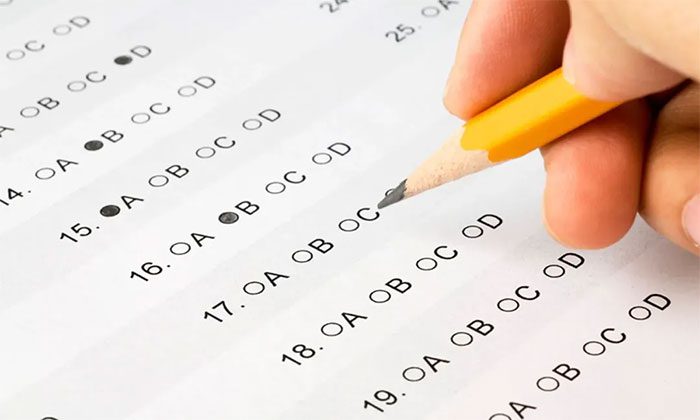Many of us may think that as our bodies age, our minds become less sharp; but is that really the case? Is it something that can be measured? Does our intelligence quotient (IQ) decline with age?
If so, at what rate? Do different types of intelligence decline at different speeds?
To address these questions, the website Metafact consulted five experts in intelligence, behavioral science, and psychology. Below are their insights.

Intelligence is often measured through a series of tests.
1. What is IQ and how is it measured?
“Intelligence is typically measured through a variety of tests, some focusing on language skills, others on non-verbal skills such as puzzles, and some on your agility in completing certain tasks” – says Michael Thomas, a psychologist and neuroscientist at Birkbeck, University of London.
“Your intelligence will be scored as the average of the points achieved across all those tasks, compared to the performance of others”
IQ tests assess various abilities, such as how well you retain and absorb information, your abstract reasoning skills, and your spatial visualization abilities.
IQ stands for “Intelligence Quotient”, and it is a standardized score in relation to others of the same age.
If you have average intelligence compared to your peers, your IQ score will be 100. If above average, the score will be above 100, and if below average, it will be below 100.
2. Does a person’s IQ change with age?
A person’s IQ does not change with age.
In other words, if you take an IQ test right now and another one in ten years, your IQ score is likely to be very similar. This is because IQ is always measured in relation to others of the same age.
“IQ is always calculated based on a person’s age, whether it’s 10, 15, 25, 50, 72, or 88. Thus, 25-year-olds will be compared to other 25-year-olds based on the number of correct answers they provide in any task, just as 50-year-olds will be compared to other 50-year-olds” – says Alan Kaufman, an intelligence testing expert from Yale University.
“For each age group, the average IQ is set at 100. We cannot directly compare the average IQ between different adult age groups because, by definition, every age group averages 100”
Meiran Nachshon, a psychologist from Ben-Gurion University, Israel, agrees with this.
“IQ indicates an individual’s relative position in relation to the average of their age group. This relative position is very stable”
To support his point, Nachshon cites a published study that you can review here, which found a strong correlation between the IQ of individuals at ages 11 and 90.
3. Does the average IQ of an age group change with age?
To understand how IQ changes over time, we must compare the IQ of older individuals with younger counterparts.
This is often very difficult to accomplish due to the reasons mentioned above. Therefore, an alternative method is needed.
Kaufman explains:
“The first thing to do is find a common standard to compare adults. We can compare the performance of 70-year-olds, 60-year-olds, 50-year-olds, 40-year-olds, etc., with groups or reference standards created for younger adults”
“In my research, we define young adults as around 30 years old (typically from 25 to 34). Thus, young adults will have an average IQ of 100, as that is how the standard is constructed. When we compare adults across all age groups with young adults, we will understand how IQ changes as we age”
Kaufman states that once the tests were completed, he observed “a clear decline in IQ.”
 Young adults will have an average IQ of 100, as that is how the standard is constructed.
Young adults will have an average IQ of 100, as that is how the standard is constructed.
4. Not all types of intelligence decline at the same rate
IQ tests measure various types of intelligence and group them together.
“Overall IQ is a synthesis of many different types of intelligence, of which the most studied are fluid intelligence and crystallized intelligence, which when combined – along with other abilities, including short-term memory and processing speed – yield the overall cognitive ability score (FSIQ)” – Kaufman explains.
“Fluid intelligence, or logical and abstract reasoning ability, reflects the capacity to solve new problems, the types of problems that you have not been taught in school” – he elaborates. “Meanwhile, crystallized intelligence or knowledge reflects the ability to learn and solve education-related and culturally adaptive problems”
The average scores for these different types of intelligence will fluctuate as you age. According to Kaufman:
– Crystallized intelligence averages 98 at ages 20-24, increases to 101 at ages 35-44, before dropping to 100 at ages 45-54, then 98 at ages 55-64, 96 at 65-69, 93 at 70-74, and 88 at over 75.
– Fluid intelligence declines much faster, peaking at 100 at ages 20-24, gradually decreasing to 99 at 25-34 and 96 at 35-44, before starting to plummet to 91 at 45-54, 86 at 55-64, 83 at 65-69, 79 at 70-74, and 72 at over 75.
Thomas states: “The fastest reaction time you can achieve is in your mid-20s, but your vocabulary knowledge will continue to grow throughout your life”
“By the end of your 60s, most cognitive skills based on what you have learned (crystallized knowledge) will either increase or recover fairly quickly. Meanwhile, the speed of performing tasks may decline”
In summary, your own IQ will not change as you age, but the average IQ of the population will certainly decline as longevity increases.


















































